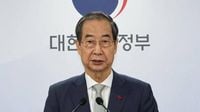On May 1, 2025, South Korea’s interim President Han Duck-soo announced his resignation during a televised address to the nation. This significant decision comes just days before the country’s presidential elections, set for June 3, 2025.
In his statement, Han expressed a desire to take on greater responsibilities for the nation’s future. He stated, "I am determined to resign to take greater responsibility for the country’s affairs." This declaration signals his intent to transition from his role as Prime Minister to a presidential candidate, a move that has been anticipated by political observers.
Han, who stepped into the presidential role following the impeachment of former President Yoon Suk-yeol, emphasized the weight of the responsibilities he currently bears. He noted, "My first priority is to continue to take on the heavy responsibility that I bear now. And the second is to work to resolve the issue and take greater responsibility." His remarks reflect a commitment to addressing the pressing challenges facing the nation.
The resignation announcement was made in a press conference held in Seoul, where Han outlined the reasoning behind his decision. He remarked that he had carefully considered the gravity of the situation, stating, "After considering the weight of responsibility at this critical time and reflecting for a long time and carefully, I have decided to resign." This introspective approach highlights the seriousness with which he views the upcoming elections.
Political analysts believe that Han's resignation is a strategic move to unite the conservative bloc in South Korea. He is expected to align with the People Power Party, the main conservative party in the country, to launch a unified campaign against the liberal candidate Lee Jae-myung. Han’s background as a potential conservative standard-bearer adds an interesting dynamic to the electoral landscape.
Han Duck-soo’s interim presidency began on December 14, 2024, after the parliament voted to impeach Yoon Suk-yeol. The impeachment stemmed from Yoon's controversial attempt to impose martial law in response to perceived threats from pro-North Korean factions within South Korea. This unprecedented move was met with significant backlash, leading to a parliamentary session that ultimately rescinded the martial law declaration.
During his interim presidency, Han faced the daunting task of navigating a politically divided nation. His tenure has been characterized by efforts to stabilize the government and regain public trust following the tumultuous events surrounding Yoon's presidency. Han’s decision to run for president is seen as an attempt to solidify his political legacy and offer a new direction for the conservative party.
As the election date approaches, the political atmosphere in South Korea is charged with anticipation. Voters are keenly aware of the implications of this election, especially in light of recent political upheavals. The upcoming campaign is expected to focus on key issues such as national security, economic stability, and the ongoing tensions with North Korea.
Han’s resignation marks a pivotal moment in South Korean politics, as the nation prepares for a new chapter in its leadership. His ability to galvanize support among conservative voters will be crucial in the weeks leading up to the election. With the backdrop of a politically charged environment, the stakes are high for all candidates involved.
In summary, Han Duck-soo's resignation is not merely a personal decision; it is a strategic move that could reshape the political landscape of South Korea. As he embarks on his presidential campaign, all eyes will be on how he positions himself against his opponents and whether he can rally the conservative base behind him. The elections on June 3 will undoubtedly be a significant turning point for the future of South Korea.




